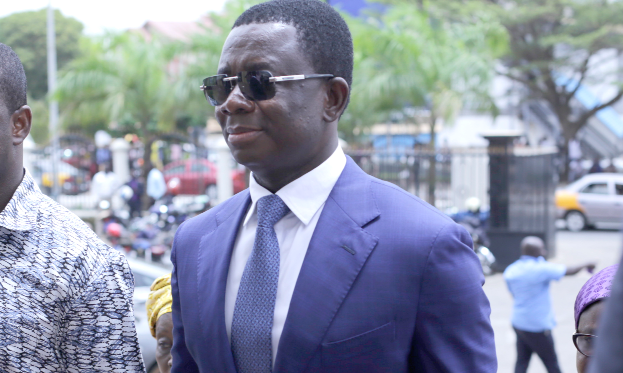
Accused persons’ fight for full disclosure
It was day two of the Republic vrs Dr Stephen Kwabena Opuni, and the eyes of lawyers, politicians, sympathisers and journalists, who had trooped to the courtroom in their numbers, were fixated on two men.
The only similarity in what the two men were saying in their lengthy submissions was their repeated mentioning of Article 19 clause 2 (e) and (g) of the 1992 Constitution.
Apart from that, the two men were in total disagreement with what the other was saying.
These two men were a Deputy Attorney-General (A-G), Mr Godfred Yeboah Dame, and Mr Samuel Cudjoe, lead counsel for Dr Opuni, who is standing trial for allegedly causing financial loss of GH¢ 271.3 million to the state during his tenure as COCOBOD boss.
Their bone of contention was whether or not Article 19 clause 2 (e) and (g) of the 1992 Constitution guaranteed Dr Opuni access to all the documents relating to him that the A-G had in its possession.
Mr Cudjoe was of the view that per Article 19 clause 2 (e) and (g), the A-G’s Department must not only provide the documents it will use to prosecute his client, but it must also provide all documents related to the case, even if the A-G would not rely on them.
On the other hand, the deputy A-G argued that some of the documents were not relevant and, therefore, there was no need to hand them to the embattled COCOBOD boss.
After more than two and half hours of legal arguments, the High Court decided to leave the matter to the Supreme Court for interpretation.
The Supreme Court is expected to give its interpretation on this provision in the 1992 Constitution on June 7, 2018.
Article 19
Article 19 (2) (e) of the 1992 Constitution states that a person charged with a criminal offence shall “be given adequate time and facilities for the preparation of this defence.”
Article 19 (2) (g) further states that a person charged with a criminal offence shall “be afforded facilities to examine, in person or by his lawyer, the witnesses called by the prosecution before the court, and to obtain the attendance and carry out the examination of witnesses to testify on the same conditions as those applicable to witnesses called by the prosecution.”
The two provisions fall under fair trial and is part of Chapter five of the 1992 Constitution which stipulates the various fundamental human rights and freedoms accorded to people in Ghana.
Full disclosure
Article 19 clauses 2 (e) and (g) are the weapons defence counsel normally use when fighting for the interests of accused persons.
It has always been the argument of counsel that “adequate time and facilities” as stipulated by Article 19 clause 2 (g) must include all prosecution evidence and other documents to aid accused persons to properly defend themselves.
That the lawyers say will prevent ambush litigation by the prosecution.
Prosecutors on the other hand, mostly argue that giving out such documents might weaken the prosecution’s case, and also demand for such documents is often an attempt by defence counsel to unnecessarily delay the case.
Make the documents available
Ghana’s Criminal Procedure Code, 1960 (Act 30) makes the disclosure of prosecution witness statements and other pieces of evidences a requirement in trials on indictment such as murder and rape.
The act does not, however, make room for such disclosures in summary trials such as robbery and fraud.
But I believe full disclosure of documents in all criminal cases is not only essential in protecting the rights of accused persons, but is also crucial for effective justice delivery.
When an accused person is put before court, the onus lies on the prosecution to prove its case beyond reasonable doubt to establish the guilt of the accused person.
State attorneys and police prosecutors always claim to have ample evidence to prove their cases and, therefore, they have nothing to lose if they make these evidence available to defence counsel.
Interestingly, in civil cases where the liberty of the defendant is not at stake, the disclosure of documents is a must, but such rights are not afforded accused persons in criminal cases, who can be jailed for many years
Right to information
Last year, the Criminal Law Reform Association, a group made up of lawyers, journalists and other professionals, presented certain proposals to the A-G on how to reform Ghana’s Criminal Justice System.
According to the group, the restriction of disclosure of documents to only indictable trials, which does not cover more than 10 offences, constitutes an infringement on the fundamental human rights of accused persons.
They, therefore, called on the government and all stakeholders in the justice delivery system of the country to ensure that pre-trial disclosure of documents becomes a statutory requirement in all cases.
We live in a country where information flow is not that forthcoming and state apparatus do not see it as their obligation to make information available.
No wonder it is taking us forever to pass the right to information bill.
But such denial of information must not be entertained in the justice delivery system of this country, because that is the only avenue where we can seek redress when our rights are disregarded.
Prosecutors see the full disclosure of all evidence and witness statements as a hindrance to their attempt to secure convictions.
But this must not be allowed to continue because in the end, we do not just want convictions, but justice for all.
Writer’s email:
